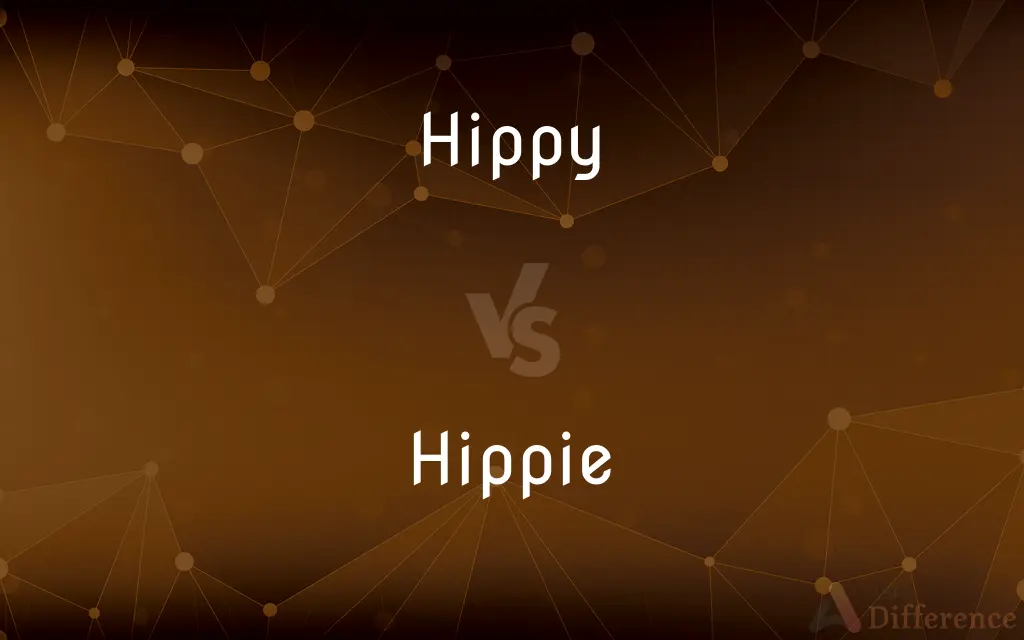Hippy vs. Hippie — What's the Difference?
Edited by Tayyaba Rehman — By Maham Liaqat — Updated on March 22, 2024
"Hippy" is an alternative spelling of "hippie," referring to members of a counterculture movement in the 1960s focused on peace, love, and freedom.

Difference Between Hippy and Hippie
Table of Contents
ADVERTISEMENT
Key Differences
The term "hippie" is the most widely recognized and used term to describe individuals who were part of a youth movement that emerged in the United States during the early 1960s. "Hippy" is simply an alternate spelling of "hippie," though it is less commonly used. Both spellings refer to the same cultural group and movement, without any difference in meaning or connotation between them.
Hippies were known for their distinctive style, which included long hair, colorful clothing, and the use of psychedelic drugs, aiming to expand consciousness and promote peace. This style and ideology contrasted sharply with the conservative norms of the time, making the movement a significant cultural and social force. Regardless of the spelling, "hippy" or "hippie," the reference is to a lifestyle and set of beliefs that challenged the status quo, promoting a more open, tolerant, and peaceful world.
The impact of the hippie movement can still be seen today in various cultural and societal norms, including environmental activism, organic farming, and the continued quest for peace and social justice. Both "hippy" and "hippie" encapsulate the spirit of this transformative era, though "hippie" remains the preferred and more common spelling in historical and cultural discussions.
The choice between "hippy" and "hippie" may come down to personal or regional preferences in spelling, but it does not affect the understanding of the movement's principles or its members. In literature, media, and popular culture, "hippie" is predominantly used, reflecting the movement's enduring influence on society and culture.
Comparison Chart
Spelling
Alternate spelling of "hippie"
Most common spelling
ADVERTISEMENT
Definition
Refers to a member of the 1960s counterculture movement
Identical to "hippy"; a person associated with a movement advocating for peace, love, and freedom
Cultural Movement
Part of the 1960s counterculture that rejected mainstream societal norms
Same as "hippy"
Clothing Style
Long hair, colorful garments, peace symbols
Identical to "hippy"
Ideology
Peace, love, environmentalism, exploration of alternative lifestyles
Same as "hippy"
Impact
Contributed to societal and cultural shifts
Same as "hippy"
Usage Preference
Less common, varies by region or individual preference
Preferred in historical and cultural contexts
Compare with Definitions
Hippy
Advocates for peace and environmentalism.
Hippies were pioneers in the modern environmental movement.
Hippie
Embraces a lifestyle opposing conventional norms.
The hippie ethos is alive in some communities today.
Hippy
Has a legacy in today's culture.
Modern music festivals echo the hippy spirit of communal experience.
Hippie
Stands for social, political, and environmental change.
Hippies were instrumental in anti-war movements.
Hippy
Known for psychedelic drug use.
Hippies promoted consciousness expansion through psychedelics.
Hippie
Identical to "hippy" – a member of the 60s counterculture.
Hippies influenced many aspects of modern culture.
Hippy
Characterized by a distinct, colorful style.
The festival was filled with people sporting hippy fashion.
Hippie
Enjoys a revival in fashion and lifestyle.
Hippie fashion has made a comeback in recent years.
Hippy
A person associated with the 1960s counterculture movement.
My grandparents were hippies who attended Woodstock.
Hippie
Continues to inspire activism.
The hippie movement has inspired generations of activists.
Hippy
Variant of hippie.
Hippie
A hippie, also spelled as hippy, is a member of the counterculture of the 1960s, originally a youth movement that began in the United States during the mid-1960s and spread to other countries around the world. The word hippie came from hipster and was used to describe beatniks who moved into New York City's Greenwich Village, San Francisco's Haight-Ashbury district, and Chicago's Old Town community.
Hippy
Someone who rejects the established culture; advocates extreme liberalism in politics and lifestyle
Hippie
(1950s slang) A teenager who imitated the beatniks.
Hippie
Someone who dresses in a hippie style.
Hippie
One who is hip.
Hippie
Of or pertaining to hippies.
That dress looks very hippie.
Hippie
Not conforming to generally accepted standards.
They used a bunch of hippie compression formats instead of the usual RAR and ZIP.
Hippie
Someone who rejects the established culture, dresses casually, and advocates extreme liberalism in politics and lifestyle. Used especially of those in the late 1960's, mostly in their late teens and early twenties, who conspicuously rejected traditional culture by dressing casually, if male wore their hair long, and wore folksy or used clothing adorned with beads, headbands, and often flowers; they emphasized the importance of love and direct personal relations rather than success-oriented businesslike behavior, strove for spontaneity, sometimes lived communally, and in some cases tried to expand their consciousness by various psychological techniques such as meditation, or through the use of consciousness-altering drugs such as marijuana or LSD. By the end of the Vietnam war in the 1970's, the numbers of people living a visibly hippie lifestyle had dramatically decreased, though some people continue to develop similar views and live with the same outlook.
Hippie
Someone who rejects the established culture; advocates extreme liberalism in politics and lifestyle
Common Curiosities
Can "hippy" still be used in writing?
Yes, "hippy" can be used, especially in personal or creative contexts, though "hippie" is more widely recognized.
Why is "hippie" the preferred spelling?
"Hippie" is the preferred spelling due to its more widespread use in historical and cultural discussions about the movement.
What did hippies stand for?
Hippies stood for peace, love, freedom, environmentalism, and the exploration of alternative lifestyles, opposing mainstream societal norms.
How were hippies viewed by society?
Hippies were often seen as rebellious and counter to the mainstream, but their ideals have been increasingly appreciated and integrated into broader societal values.
What is a common misconception about hippies?
A common misconception is that all hippies used drugs or were disengaged from society; many were deeply involved in political and environmental activism.
How did hippies impact society?
Hippies contributed to significant cultural and societal shifts, including movements for peace, environmental activism, and changes in fashion and music.
How did hippies influence fashion?
Hippies influenced fashion with their distinctive style featuring long hair, tie-dye, bell-bottoms, and handmade accessories, impacting mainstream fashion.
Did hippies have a political impact?
Yes, hippies were involved in significant political movements, especially those against war and in favor of civil rights and environmental protection.
Are there modern hippies?
Yes, the hippie ethos influences various modern subcultures and movements that advocate for similar values of peace, environmentalism, and social justice.
What role did music play in the hippie movement?
Music was central to the hippie movement, serving as a form of expression, protest, and community building, with festivals like Woodstock becoming iconic.
Is there a difference between "hippy" and "hippie"?
No, "hippy" and "hippie" refer to the same counterculture movement of the 1960s, with "hippie" being the more common spelling.
Did hippies have a specific philosophy?
While diverse, hippie philosophy generally embraced peace, love, freedom, and the rejection of materialism and conventional societal structures.
Are "hippy" and "hippie" used differently in different countries?
The usage of "hippy" vs. "hippie" may vary regionally, but "hippie" is universally recognized and understood to represent the movement.
How did the hippie movement start?
The hippie movement started in the early 1960s in the United States, largely as a reaction to conservative societal norms and the Vietnam War.
Has the hippie movement faded away?
While the original hippie movement is historical, its values and cultural influences persist, inspiring contemporary movements and lifestyles.
Share Your Discovery

Previous Comparison
Touristic vs. Tourist
Next Comparison
Intramural vs. IntraluminalAuthor Spotlight
Written by
Maham LiaqatEdited by
Tayyaba RehmanTayyaba Rehman is a distinguished writer, currently serving as a primary contributor to askdifference.com. As a researcher in semantics and etymology, Tayyaba's passion for the complexity of languages and their distinctions has found a perfect home on the platform. Tayyaba delves into the intricacies of language, distinguishing between commonly confused words and phrases, thereby providing clarity for readers worldwide.














































